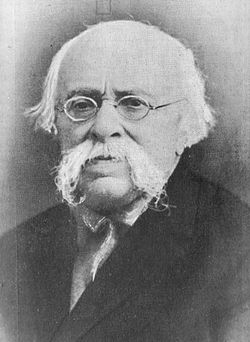
Back ألكسندرو فيليبيد Arabic اليكساندرو فيليپيد ARZ Alexandru Philippide German Alexandru Philippide Italian Alexandru Philippide Romanian Филиппиде, Александру Russian
Alexandru I. Philippide | |
|---|---|
 | |
| Born | May 1, 1859 |
| Died | August 12, 1933 (aged 74) |
| Academic background | |
| Influences | Timotei Cipariu, Bogdan Petriceicu Hasdeu, Mihail Kogălniceanu, Alexandru Lambrior, Titu Maiorescu, Hermann Paul, Gustav Weigand |
| Academic work | |
| Era | late 19th–early 20th century |
| School or tradition | Neogrammarian Junimea |
| Main interests | phonology, Indo-European studies, literary criticism, aesthetics, history of Romania, literature of Romania |
| Influenced | Vasile Bogrea, Dimitrie Găzdaru, Gheorghe Ghibănescu, Iorgu Iordan, Gheorghe Ivănescu, Haralambie Mihăescu, Giorge Pascu, Ioan Șiadbei |
Alexandru I. Philippide (Romanian pronunciation: [alekˈsandru filiˈpide]; May 1, 1859 – August 12, 1933) was a Romanian linguist and philologist. Educated in Iași and Halle, he taught high school for several years until 1893, when he secured a professorship at the University of Iași that he would hold until his death forty years later. He began publishing books on the Romanian language around the time he graduated from university, but it was not until he became a professor that he drew wider attention, thanks to a study of the language's history. Although not particularly ideological, he penned sharp, witty polemics directed at various intellectual figures, both at home and, in one noted case, in Germany.
In 1898, Philippide began work on a Romanian dictionary; by 1906, he and his team had completed the first four letters of the alphabet before others took over the task. His major work, which appeared in two hefty volumes in 1925 and 1928, brings together a wide range of ancient sources and linguistic evidence to analyze the ethnogenesis of the Romanians and the development of their language. Although attacked for parochialism by one set of academics, the students he trained carried forth his ideas by forming the core of an Iași-based linguistic school.